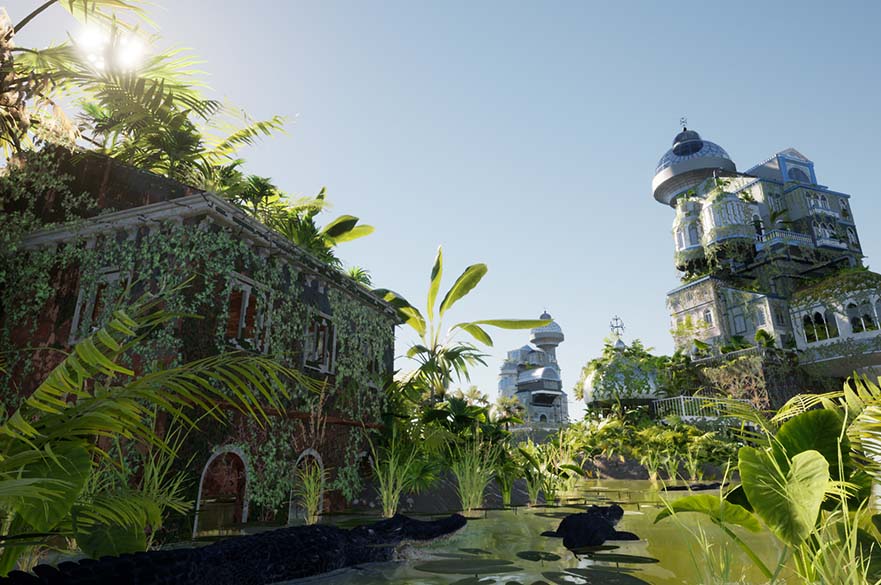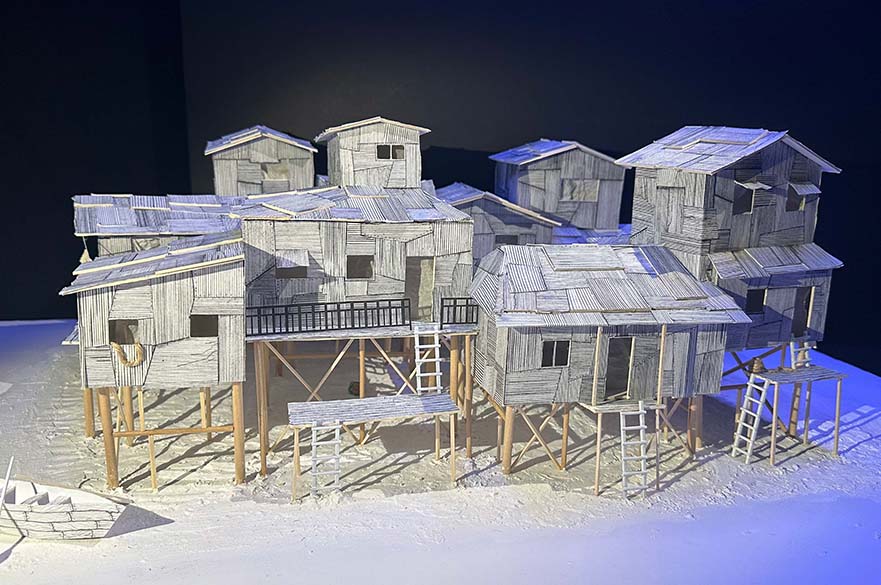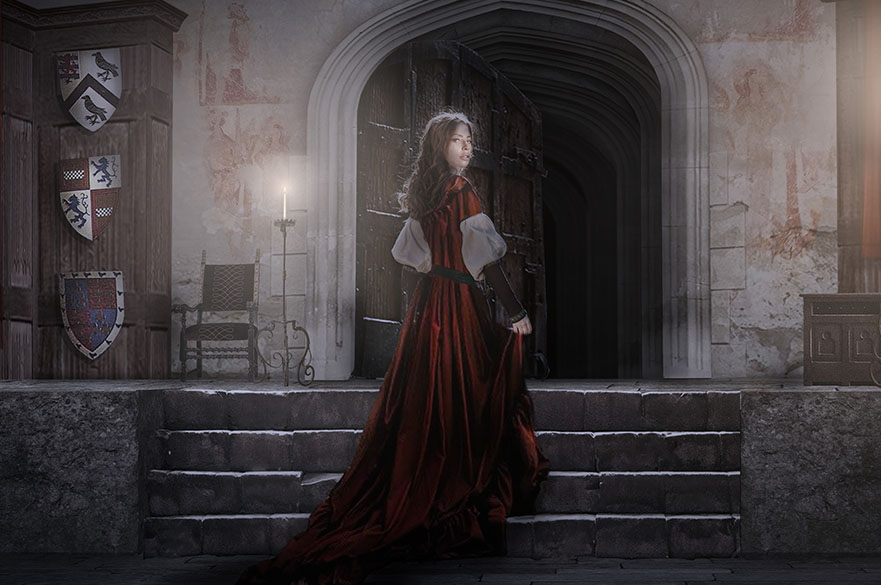20
Design for Film and Television BA (Hons)
- Level(s) of Study: Undergraduate
- Typical Offer: 104 - 112 UCAS tariff points
- UCAS Code(s): W280
- Start Date(s): September 2024
- Duration: 3 / 4 year(s)
- Study Mode(s): Full-time / Sandwich
- Campus: City Campus
Introduction:
Created in close collaboration with the film and television industry, this course will prepare you for a successful career as a production designer, art director or other art department role. Learn a wide range of art department skills including set design, visualisation and drafting.
-
You’ll have the opportunity to complete a work experience placement of up to a year in length. Dependent on the duration of your placement, you could gain an additional Diploma or Certificate in Professional Practice.
-
Industry experts and specialists are a regular feature of the course, either delivering guest lectures and workshops or working more closely with you on live projects. Recent industry experts include: Oscar-nominated production designer Maria Djurkovic (Tinker Tailor Soldier Spy, Billy Elliot, The Imitation Game) and BAFTA award-winning production designer Charles Wood (Guardians of the Galaxy, Doctor Strange).
-
Opportunity to apply for a European or international exchange at one of our partner institutions. You can also attend study trips, recent study trips have included the Harry Potter film studios, London and the Luc Besson studios, Paris.
-
This course is industry recognised by ScreenSkills, the industry-led skills body for the UK's screen-based industries, and carries the ScreenSkills Select quality-mark which indicates courses best suited to prepare students for a career in the screen industries.
What you’ll study
This course’s industry connections result in exciting guest lectures, live projects and work experience opportunities. You’ll study in facilities that reflect the latest industry standards, learning from staff with extensive experience in their field. You’ll collaborate with your fellow students and work independently on a range of exciting projects that will develop your skills, and focus your career goals.
In your final year, you’ll showcase your work and have the opportunity to exhibit at a national or international show or high-profile industry venue, such as Pinewood Studios.
Art Department Skills
(40 credit points)
Develop your understanding of the roles and skills needed in an Art Department in the Film and Television industries. Through three independent and collaborative projects, you will develop a foundation of skills and vocabulary relevant to Designing for Film and TV; including the creation of mood boards and visuals, perspective drawing, technical drawing, model making, prop making and workshop skills.
Design Concepts and Practice
(40 credit points)
Build on the practical skills learnt in the art department module, whilst introducing you to the key role of the Production Designer and their responsibilities such as looking at script analysis and breakdown, concept drawing, how to create mood and atmosphere, storyboarding, character profiling, costume, colour theory, set dressing and scenic finishes in order for you to consider these vital design tools in your design work to create credible worlds.
Introducing Digital Skills
(20 credit points)
Compliment and add to the skills being learnt in the Design Concepts and Practice module by exploring a range of new and emerging digital skills used within the screen industry such as 2D digital visualisation, 3D digital modelling and 3D printing. You will put this software and techniques into practice by creating a 2D digital visual and 3D digital model of your designs from a previous design or the Design Concepts and Practices module.
Visual Culture and Narratives
(20 credit points)
Develop an appreciation of Visual Culture and Narratives and their relevance and influence on our Film & Television history and industry by building your knowledge of art movements, cultural phenomena and forms through social and historical pivot points. This will be through a range of means including lectures, film viewings, tutorials, debates, independent study and workshops.
Industry Craft and Context
(40 credit points)
Building on the knowledge and skills you acquired in Year One, you will further develop your art department skills, while enhancing your contextual understanding of film and TV craft. It also represents a step up towards professional standards of time management and producing work of high quality within tight deadlines.
OR
Industry Placement
(40 credit points)
Develop your personal direction and career aspirations with a professional placement, negotiated with your placement tutor, preparing you for entry into the performance/cultural industries. This will take you out into industry to extend the development of your professional practice. You will be expected to document this experience, bringing back your knowledge and sharing it with your peers as part of a symposium at the end of the module.
Advanced Skills and Concepts
(40 credit points)
Take your art department skills to the next level, while enhancing your production design ideation and conceptualisation abilities. You will be challenged to offer viable design solutions to complex creative briefs, preparing you for the high-concept, autonomous work required in Year 3 and your careers in the industry.
Co Lab: Research, Exploration and Risk-taking
(20 credit points)
Through active participation with team-based problem-solving, you will work together in mixed teams on a project where you will use your creative ideas to generate solutions to the challenge or brief. Your project will allow you to explore how creativity can make an impact in society, as you choose a theme of sustainability, social justice, enterprise and innovation or community. This collaborative learning experience will expose you to a range of new processes and approaches that will develop your creative thinking.
Optional module
You will also choose one 20-credit module from:
- 3D Materials and Exploration
- Storyboarding
- Model Making: Object and Narrative
- Character Ideation
- Experimental Animation
- Motion Graphics
- Digital Matte Painting
- Music Video
Optional Placement Year (Sandwich)*
We have an option for all of our students to undertake a placement year (Sandwich) and allow you to decide whether this is right for you once you have completed years 1 and 2 of your course. This time spent working in industry provides our students with crucial work experience, which is highly prized and much sought after by employers upon graduation. If you are successful in securing a placement you will have the chance to gain an additional Certificate or Diploma in Professional Practice, dependent on duration.
* If you choose to take the sandwich route option, you will still need to apply for this course with the full-time UCAS code: W280
Art Department Practice
(40 credit points)
This module is aimed to mirror an art department in the film and television industry by setting a series of 'art department' requirements following a process from script to design concept. The module requires you to work collaboratively in achieving the required output by tasking roles within a professional art department. Students will be assessed individually.
Production Design Portfolio
(60 credit points)
Culminate all your skills learnt to a professional level that can be sent to Production Designers and Art Directors and associated departments to start your journey into the Film and Television Industry. You will increase your autonomy whilst designing from a self negotiated 'script' or 'text' and present your designs and supporting technical skills in a 'branded' portfolio.
Reflective Practice
(20 credit points)
Challenge your reflective skills through the use of a journal format to identify and evaluate your personal and professional direction to align with your future goals and ambitions. Throughout the duration of the module, students will engage in lectures and various theoretical and practical activities relating to the professional practice of designing for Film and Television.
Don’t just take our word for it, hear from our students themselves
Student Work
Video Gallery
How you’re taught
On this course, you’ll spend most of your time in a creative studio environment. Teaching and learning experiences will include group and independent projects, demonstrations, tutorials, lectures and seminars. You’ll also benefit from study visits and work experience and be expected to keep a reflective journal.
Co Lab
Want real-world experience alongside your degree? Co Lab is your opportunity to work with peers from different disciplines on live projects set by industry partners. Embrace collaborative practice as you explore how creativity can make an impact in society and develop the skills employers want to see in the creative industries.
Exchange opportunities
If you’re thinking about studying part of your degree abroad, the course has exchange agreements with a number of institutions around the world.
Exchanges take place in Year Two of the course. You’ll receive guidance from the University about where you can study, and help in completing your application and arranging your exchange.
Contact hours
- Year 1 lectures/seminars/workshops (28%), independent study (72%).
- Year 2 lectures/seminars/workshops (22%), independent study (78%).
- Year 3 lectures/seminars/workshops (20%), independent study (80%).
How you’re assessed
Assessment is 100% through coursework. You’ll receive feedback throughout each module and will have opportunities to discuss feedback, identify areas of strength and weakness, and set personal goals. Depending on the module, you may be assessed through design presentations, submissions of artefacts (e.g. props) and portfolios, as well as written work and peer assessment.
- Year 1 coursework (100%)
- Year 2 coursework (100%)
- Year 3 coursework (100%)
People excel in different ways, and we want everybody to have the best possible chance of success. On this course you will be assessed on a range of individual and group presentations, and your final year project. Your work in Year Two accounts for 20% of your final degree mark, and your work in your final year accounts for the other 80%
Careers and employability
77.8% of our students are in employment and/or further study within 15 months after graduation (Graduate Outcomes Survey, 2020/21).
Graduates have gone on to work as production designers, art directors, and in a wide range of art department roles within film and television for companies including:
- BBC
- ITV
- Channel 4
- Mammoth
- Tiger Aspect.
Some projects our graduates have been involved with include:
- Star Wars
- the Marvel franchise
- The Fast and The Furious.
TV productions our graduates have been involved with include:
- EastEnders
- Emmerdale
- Killing Eve
- Victoria
- Bad Education
- Gentleman Jack .
Connecting with industry
You’ll have the opportunity to engage with industry through real-situation design projects and lectures from guest speakers. Industry professionals that have recently shared their knowledge and experience include:
- Oscar-nominated production designer Maria Djurkovic (Tinker Tailor Soldier Spy, Billy Elliot, The Imitation Game)
- BAFTA award-winning production designer Charles Wood (Guardians of the Galaxy, Doctor Strange)
- Donal Woods, production designer (Downton Abbey)
- Tim Napper, concept artist (Star Wars, Dark Crystal)
- lighting designer Mike LeFevre (The Andrew Marr Show, Globe Theatre, and the Royal Opera House).
Creative Industries Federation
We are members of the Creative Industries Federation (CIF), which means students in the Nottingham School of Art & Design have the opportunity to sign up to free student membership. Creative Industries Federation are an organisation that represents, champions and supports the UK’s creative industries and membership grants students exclusive access to their selection of resources and events to help advance your career and connect with industry.
Showcase
You will be given the opportunity to exhibit your work during your time at NTU to members of the creative industries. Visit our ‘We Are Creatives’ showcase to take a look at the work of this year's graduating students’.
Campus and facilities
You’ll be based in the Waverley building – a beautifully restored listed building with real design heritage: it was the original home of the Nottingham School of Art. View our Nottingham School of Art & Design Facilities Hub here.
Entry requirements
What are we looking for?
You will need one of the following options:
- 104 - 112 UCAS Tariff points from up to four qualifications (two of which must be A-level equivalent).
Other requirements
Other qualifications and experience
We will consider equivalent qualifications and combinations, please see UCAS course search for details.
We may also consider credits achieved at other universities and your work/life experience through an assessment of prior learning. This may be for year one entry, or beyond the beginning of a course where applicable, for example, into year 2. Our Recognition of Prior Learning and Credit Transfer Policy outlines the process and options available for this route.
Contextual offers
As well as assessing your application and qualifications, we use contextual data and information to make offers for this course. Depending on your circumstances, we may make you an offer up to two grades below the standard entry criteria. Find out how we assess your application.
Meeting our entry requirements
Hundreds of qualifications in the UK have UCAS tariff points attached to specific grades, including A levels, BTECs, T Levels and many more. You can use your grades and points from up to four different qualifications to meet our criteria. Enter your predicted or achieved grades into our tariff calculator to find out how many points your qualifications are worth.
Getting in touch
If you need more help or information, get in touch through our enquiry form
International qualifications
We accept qualifications from all over the world – check yours here:
Undergraduate preparation courses (Foundation)
If you don’t yet meet our entry requirements, we offer Foundation courses through our partner Nottingham Trent International College (NTIC), based on our City Campus:
English language entry requirements
You can meet our language requirements by successfully completing our pre-sessional English course for an agreed length of time, or by submitting the required grade in one of our accepted English language tests, such as IELTS:
Advanced standing (starting your undergraduate degree in year 2 or 3)
You may be able to start your undergraduate course in year 2 or 3 based on what you have studied before. This decision would be made in accordance with our Recognition of Prior Learning and Credit Transfer Policy.
Would you like some advice on your study plans?
Our international teams are highly experienced in answering queries from students all over the world. We also have members of staff based in Vietnam, China, India and Nigeria and work with a worldwide network of education counsellors.
- Complete this simple form to keep in touch with the International Office.
Fees and funding
Preparing for the financial side of student life is important, but there's no need to feel anxious and confused about it. We hope that our fees and funding pages will answer all your questions.
Getting in touch
For more advice and guidance, you can contact our Student Financial Support Service.
Tel: +44 (0)115 848 2494
What's included in the course fees?
As part of the course, we will provide some basic materials and some necessary printed materials.
The School will cover the costs of any mandatory study trips.
In Final Year, the Nottingham School of Art & Design will provide infrastructure costs for your Showcase. If you’re selected to exhibit your work at a graduate show in London, the School will cover the cost of transporting your work, the exhibition stand and event set-up.
Additional costs
Print and copy costs
The University allocates an annual printing and copying allowance of £20 depending on the course you are studying. For more details about costs for additional print and copying required over and above the annual allowance please see the Printing, photocopying and scanning information on the Library website.
We advise you to budget up to £100 per year for printing costs. This is related to personal portfolios. However, submissions can be made electronically, keeping printing requirements to a minimum.
Material costs
Depending on the projects you choose to work on, you may need to budget £100-£250 each year for materials and equipment. This is of course an approximation as your projects are highly personalised.
Stationery and reading materials
Most study modules will recommend one or more core textbooks, which many students choose to purchase. Book costs vary between courses and further information is available in the University’s bookshop, Blackwell’s. A good supply of these essential text books are available in the University libraries, which students can easily borrow or access online/directly whilst studying in the library. You should budget £50 – £100 per year (approximately) for reading materials.
Field trips
All essential field trip costs will be included in your course fees. There may also be an opportunity to take part in an optional field trip to a European destination that will be tailored to suit your course.
Placements
If you're undertaking a placement year, you'll need to budget for accommodation and any travel costs you may incur whilst on placement. Many of our placement students do earn a salary whilst on placement which can help to cover these living costs.
If you undertake work experience or a longer placement, you will have the chance to gain an additional Certificate or Diploma in Professional Practice, dependent on duration. The Diploma in Professional Practice incurs a fee for the additional placement year.
Preparing for the financial side of student life is important, but there's no need to feel anxious and confused about it. We hope that our fees and funding pages will answer all your questions.
You might be able to get a scholarship to help fund your studies. We award scholarships to those international students who can demonstrate excellent achievement, passion, and dedication to their studies.
Please take a look at our International students page for information about fees, scholarships for international students, visas and much more.
Getting in touch
For more advice and guidance, you can contact our Student Financial Support Service.
Tel: +44 (0)115 848 2494
What's included in the course fees?
As part of the course, we will provide some basic materials and some necessary printed materials.
The School will cover the costs of any mandatory study trips.
In Final Year, the Nottingham School of Art & Design will provide infrastructure costs for your Showcase. If you’re selected to exhibit your work at a graduate show in London, the School will cover the cost of transporting your work, the exhibition stand and event set-up.
Additional costs
Print and copy costs
The University allocates an annual printing and copying allowance of £20 depending on the course you are studying. For more details about costs for additional print and copying required over and above the annual allowance please see the Printing, photocopying and scanning information on the Library website.
We advise you to budget up to £100 per year for printing costs. This is related to personal portfolios. However, submissions can be made electronically, keeping printing requirements to a minimum.
Material costs
Depending on the projects you choose to work on, you may need to budget £100-£250 each year for materials and equipment. This is of course an approximation as your projects are highly personalised.
Stationery and reading materials
Most study modules will recommend one or more core textbooks, which many students choose to purchase. Book costs vary between courses and further information is available in the University’s bookshop, Blackwell’s. A good supply of these essential text books are available in the University libraries, which students can easily borrow or access online/directly whilst studying in the library. You should budget £50 – £100 per year (approximately) for reading materials.
Field trips
All essential field trip costs will be included in your course fees. There may also be an opportunity to take part in an optional field trip to a European destination that will be tailored to suit your course.
Placements
If you're undertaking a placement year, you'll need to budget for accommodation and any travel costs you may incur whilst on placement. Many of our placement students do earn a salary whilst on placement which can help to cover these living costs.
If you undertake work experience or a longer placement, you will have the chance to gain an additional Certificate or Diploma in Professional Practice, dependent on duration. The Diploma in Professional Practice incurs a fee for the additional placement year.
How to apply
Apply through UCAS.
We will ask you to provide a digital portfolio. Visit our webpage which has some advice on what to include to help make your portfolio stand out. After you have submitted your portfolio, we may also invite you to an online interview to help us make our final decision.
You can apply for this course through UCAS. If you are not applying to any other UK universities, you can apply directly to us on our NTU applicant portal.
Application advice
Apply early so that you have enough time to prepare – processing times for Student visas can vary, for example. After you've applied, we'll be sending you important emails throughout the application process – so check your emails regularly, including your junk mail folder.
Writing your personal statement
Be honest, thorough, and persuasive – we can only make a decision about your application based on what you tell us:
Your portfolio
If your initial application is successful, you may be asked to upload a portfolio of your work and you may also be asked to attend an interview.
Would you like some advice on your study plans?
Our international teams are highly experienced in answering queries from students all over the world. We also have members of staff based in Vietnam, China, India and Nigeria and work with a worldwide network of education counsellors.
- Complete this simple form to keep in touch with the International Office.
The University's commitment to delivering the educational services advertised.




